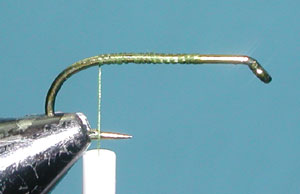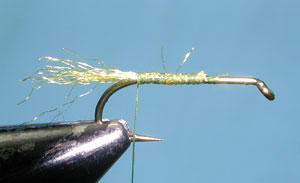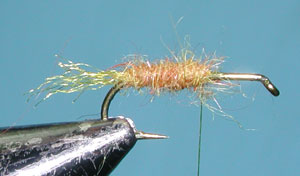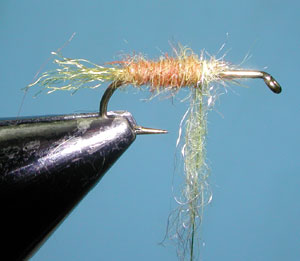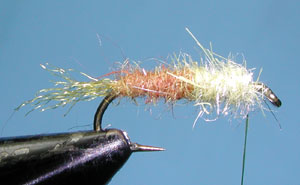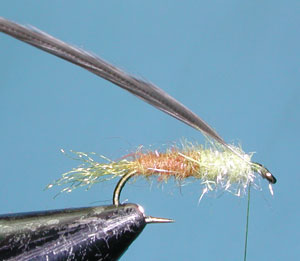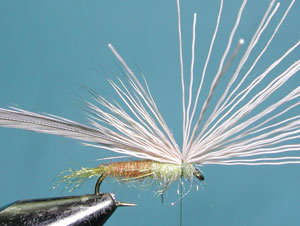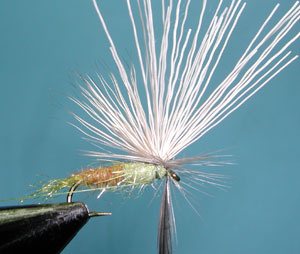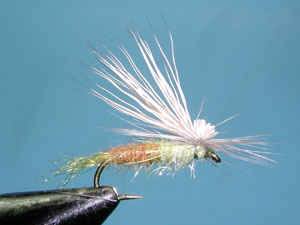E/C Caddis – innovative and effective
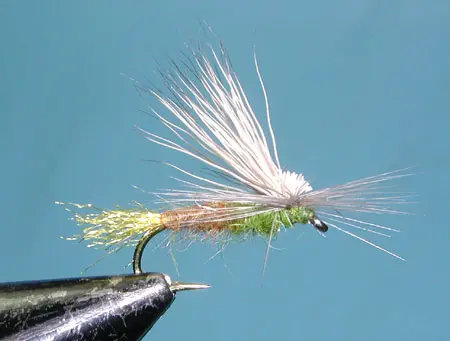
Olive Brown E/C Caddis
Tying Instructions
| Materials
to Order Material, click the link |
|
|---|---|
| Hook | TMC 9300 #14-18 |
| Thread | Uni-thread Olive 8/0 |
| Body | Light Olive Brown Haretron |
| Thorax | Caddis Green Haretron |
| Shuck | Ginger Z-Lon |
| Wing | Natural Brown Elk Hair |
| Hackle | Dun Hackle |
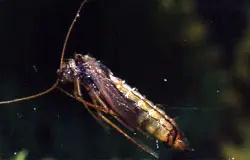
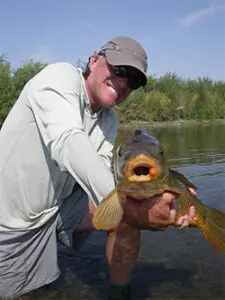
Ralph Cutter
E/C Caddis
This is probably the most popular fly designed by Sierran fly fisher, Ralph Cutter, and introduced to the public in 1981. The E/C Caddis is an emergent/cripple caddis pattern developed for the large caddis hatches that frequent the Truckee River. At first, he tried to utilize a palmered body similar to the Elk Hair Caddis but noticed that the silhouette underwater was not similar to the naturals since the fly rode too high on the surface film. Then, Ralph switched to a parachute wrap and utilized the Elk Hair wing as the wing post. As a result, the fly rode deeper within the surface film and looked much closer to the naturals.
Two toned body
Another important feature to this fly is the two-toned body which provides contrast and attraction. Ralph believes that the darker abdomen coloration creates an appearance of the shuck still encapsulating the lower part of the caddis body. The shuck consists of Z-lon material which absorbs water and allows the rear portion of the fly to sink within the surface film. The wing can be either Deer Hair or Elk Hair. Elk Hair will flare less than Deer hair and this can give the fly a better caddis profile. However, Deer Hair will have a better floatation and might be a better choice for faster moving waters. The most common colorations are Olive Brown/Caddis Green, Tan/Olive and Black.
Since the E/C Caddis resides low in the surface film, it is often used on slow-moving waters. Often, Ralph will apply floatant to the leader as well as the wing, thorax, and hackle to help with floatation on swifter waters. However, since the fly is difficult to see, an indicator is often useful. Above all, the E/C Caddis has built a reputation as an excellent caddis pattern throughout the world and remains one of the best for the Sierra.
Variations
Colin (Sandy) Pittendrigh designed a pattern he called the Flat Caddis Deer Hairaround the early 80’s that places the hackle beneath the wing similar to the E/C Caddis. Colin created a “bodyless” variation that allows the wing to lay horizontally. According to Colin, “Most tiers end up with a near-vertical wing, after winding the hackle. If you lash the wing on loosely, and then build up a bit of a thread post, below the wing, by winding thread horizontally–before winding the horizontal parachute–then you don’t force the wing to stand up almost straight.” Colin applies a micro-drop of Super Glue to the base of the wing to hold the loose wraps together after the hackle is wound.
Hot Creek Caddis
One variation to the E/C Caddis is theHot Creek Caddis designed by the late Eric Otzinger while he worked at Bob Marriott’s Fly Shop in the mid-90’s. Eric’s pattern is tied with a gray dubbing to represent the small gray sedge that frequents Hot Creek. His pattern is tied to smaller hook sizes of #16-22 and he leaves off any trailing shuck. This makes the pattern a true dry fly, which is required to fish the Hot Creek Ranch private waters. The pattern has also been successful on other slow-moving waters such as the Lower Owens.
Missing Link Caddis
Another variation is Mike Mercer’s Missing Link Caddis. Mike introduced this pattern in the March 2010 of Fly Fisherman magazine. He experienced a situation where the fish selectively fed only on the dying or dead caddis adults after they released eggs. The rises were slow and regular. To represent a gaunt body, Mike tied a thread abdomen with a sparse flashabou rib and coated it with Softex. The spent wings were represented by z-lon with a small dubbed ball of ice dubbing to keep the z-lon strands from collapsing. The upright wing came from the E/C Caddis pattern and assists in seeing the fly as well as providing some additional floatation.
Variations
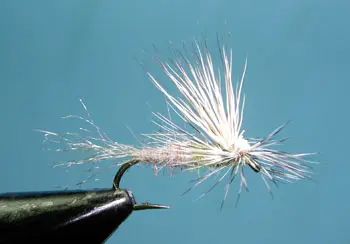
Tan E/C Caddis
| Hook | TMC 9300 #14-16 |
| Thread | Uni-thread Olive 8/0 |
| Body | Olive Tan Haretron |
| Thorax | Olive Tan Haretron |
| Shuck | Cream Z-lon |
| Wing | Natural Brown Elk Hair |
| Hackle | Grizzly Hackle |
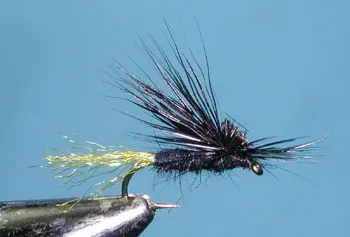
Black E/C Caddis
| Hook | TMC 9300 #14-16 |
| Thread | Uni-thread Black 8/0 |
| Body | Black Haretron |
| Thorax | Black Haretron |
| Shuck | Ginger Z-lon |
| Wing | Black Dyed Deer Hair |
| Hackle | Black Hackle |
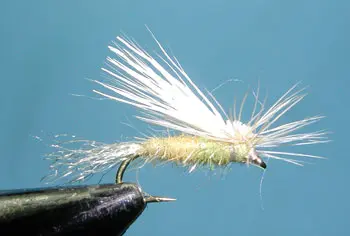
Golden E/C Caddis
| Hook | TMC 9300 #14-16 |
| Thread | Uni-thread Tan 8/0 |
| Body | Golden Stone Haretron |
| Thorax | Olive Haretron |
| Shuck | Cream Z-lon |
| Wing | Bleached Elk Hair |
| Hackle | Ginger Hackle |
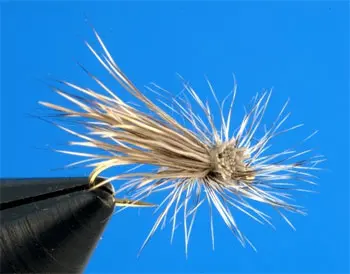
Flat Caddis
| Hook | TMC101 #14-16 |
| Thread | Danville Gray 6/0 |
| Body | Baetis Olive Dyed Quill |
| Thorax | Black Superfine |
| Tail | White Spade Hackles |
| Wing | Coastal Deer Hair |
| Hackle | Grizzly Hackle |
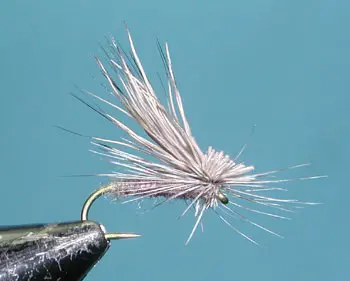
Hot Creek Caddis
| Hook | TMC 100 #16-22 |
| Thread | Uni Thread 8/0 Gray |
| Body | Gray Superfine |
| Thorax | Gray Superfine |
| Tail | Med. Dun Spade Hackles |
| Wingpost | Coastal Deer Hair |
| Hackle | Grizzly Hackle |
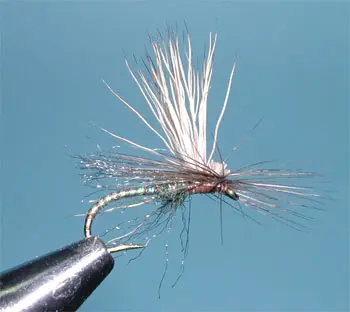
Missing Link Caddis
| Hook | TMC 9300 #14-16 |
| Thread | Uni-thread Camel 8/0 |
| Body | Uni-thread Camel 8/0,coated with Loon Soft Head Clear |
| Downwing | Dun Zlon |
| Rib | Pearl Flashabou |
| Thorax | Peacock Ice Dub |
| Wing | Natural Elk Hair |
| Hackle | Blue Dun Saddle Hackle |

